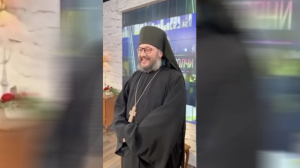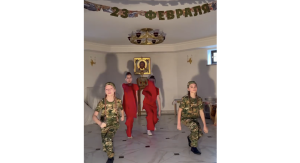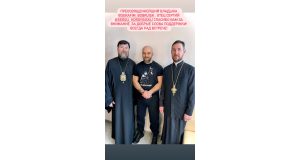Cyril Hovorun. The Belarusian Protests and the Orthodox Church

Responding to: Orthodoxy in the Belarus Protests
In Russia, there is a widely spread superstition that August brings national-scale catastrophes. The mass protests in Belarus against Alyaksandr Lukashenka are seen as such a catastrophe for the regime of Vladimir Putin. Even though Mr. Lukashenka struggled to preserve some independence for his country from Russia, Belarus under his rule represented the model of a Neo-Soviet colony that Russia has tried to impose on its neighbors since Putin’s presidency began. Belarus under Mr. Lukashenka preserved many symbols and most of the ethos of the Soviet era.
The key feature of the Soviet ethos is paternalism, which means that the regime offers its subjects basic social welfare in exchange for complete obedience. The Ukrainian Revolution of Dignity in 2014 (also known as the Maidan), for example, was a revolt against this sort of paternalism. What is going on now in Belarus looks more like a revolution that started within the paternalistic framework. There are good signs, however, that eventually the Belarusian revolution will turn against paternalism as such.
This is not going to be easy. For the many years that he has been in power (since 1994), Mr. Lukashenka offered the Belarusians a social contract: their complete obedience in exchange for paternalistic basic welfare and an illusion of stability. Now this social contract is broken. Most Belarusians believe that it was Lukashenka who broke it by the way he treated them in the last days. Several Belarusians were killed by the regime and thousands tortured with unprecedented cruelty. Lukashenka, in his turn, believes that the Belarusians broke the contract by not obediently accepting the results of the elections, which he does not even pretend to present as fair.
It seems, however, that the paternalistic contract was broken earlier. One of Lukashenka’s serious mistakes that made many Belarusians think he was unable to fulfill the contract was his demonstrative ignorance of COVID-19. He publicly mocked those who took the pandemic seriously and forced people into the situations wherein they could easily contract the coronavirus. For example, on May 9, he gathered crowds for the Victory Parade in Minsk. Even Mr. Putin decided not to have such a parade in Moscow and was irritated by Mr. Lukashenka’s initiative. In the meantime, the health system in Belarus was suffocated by the high numbers of COVID-19 patients, and the state did not seem to care. People had to take care of themselves and the suffering coronavirus patients—pretty much outside the social contract they believed they had with Lukashenka. It seems that COVID-19, or rather ignoring it, has challenged dictators on both sides of the Atlantic.
It is very tempting to compare the Belarusian protests with the Ukrainian Maidan. Belarusians do not like such comparisons—for various reasons. Many have been brainwashed by the official Russian and Belarusian propagandas, which concurred in condemning the Maidan. Others do not like to stay in the shadow of the Ukrainian Revolution of Dignity. There are indeed many similarities and dissimilarities between the two revolutions, which it is now not a good time to analyze. There is, however, a parallel, which is worthy exploring: between the attitudes of the churches.
The leadership of the Russian Orthodox Church in 2014 and now made the same mistake of publicly supporting the unpopular dictators. Such support stems from the policy of Patriarch Kirill, which he always had even before he became the Patriarch, to focus on political elites and ignore masses. This policy repaid him with some popularity among those in power but created a chasm between him and the ordinary flocks, first in Ukraine and now in Belarus. The same chasm between the lay and hierarchy is widening in Russia.
Following in the steps of the Patriarch, the church leadership in Belarus demonstrated the same blindness to the masses’ demands. For example, the statement by the synod of the Belarusian Orthodox Church under the Moscow Patriarchate on August 15 only vaguely condemned violence, without identifying the perpetrators, and, more importantly, kept complete silence on the reasons of the mass unrest. Only a couple of hierarchical voices were raised against the injustice of Lukashenka’s regime, with the loudest and most eloquent one by the Archbishop of Grodno and Volkovysk Artemy. Much more outspoken appears to be the Catholic Church in Belarus. Its Metropolitan Archbishop Tadeusz Kondrusiewicz, together with other Catholic bishops, has clearly identified and condemned the perpetrators of violence and injustice. Catholic hierarchs openly supported the people who rose against the regime. The standpoint of the Catholic Church in Belarus is very similar to the standpoint of the Greek Catholic Church in Ukraine in 2014.
There is another similarity between Ukraine and Belarus that I cannot skip: the ecumenical character of the protests. Like the Maidan in Ukraine was an ecumenical event, where people of different confessions and even religions stood next to each other and prayed together, so lay people and some clergy from different Christian denominations came together in Belarus in the same religious processions. On August 18, Archbishop Kondrusiewicz led an ecumenical prayer in Minsk, with the participation of representatives from various churches and religious groups, including an Orthodox priest. The Belarusian protests, thus, although they pursue political goals, clearly feature a religious agenda. They are not secular like most political protests in the West. In this, they are similar to the Ukrainian Maidan, which inspired even a specific “Ukrainian public theology.” I hope a “Belarusian public theology” will emerge as a reflection on what is happening in the country now.
Editor’s Note: This post was originally published on August 20, 2020 by Public Orthodoxy, a publication of the Orthodox Christian Studies Center of Fordham University.
Archimandrite Cyril Hovorun is professor of ecclesiology, international relations, and ecumenism at Sankt Ignatius Theological Academy and the Stockholm School of Theology. Ordained in the Orthodox Church, Hovorun previously served as acting director of the Huffington Ecumenical Institute at Loyola Marymount University in Los Angeles. His main fields of expertise are early Christian traditions, ecclesiology, and public theology.








